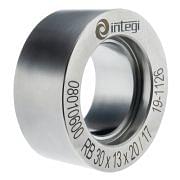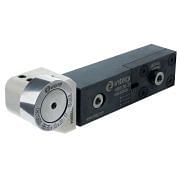Groove and cutting on turning
Turning tools are essential tools in precision machining, used to improve the surface quality and strength of components.
Thread rolling is a mechanical process that improves the surface finish and mechanical properties of a part by applying pressure via rollers. This process is essential to obtain smooth surfaces, increase fatigue resistance and improve component durability.
Surface Finish Rollers
Rollers are widely used to improve the surface finish of various components. This process reduces surface roughness, making the surface smoother and shinier. High quality surface finish is crucial for components requiring low friction and increased wear resistance.
How to Choose Lathe Rollers
The choice of lathe rollers depends on various factors, including:
- Workpiece Material: The hardness and material composition influence the choice of tool.
- Type of Machining: Consider whether the thread rolling is to improve surface finish, increase fatigue strength or both.
- Machine Specification: Compatibility with the lathe or equipment used is critical.
- Frequency of Use: For frequent operations, it is advisable to invest in high quality and durable tools.
Rollers offer numerous advantages in machining operations:
- Improved Surface Finish: Thread rolling can reduce surface roughness, resulting in smooth, shiny surfaces.
- Increased Fatigue Resistance: The rolling process induces compressive stresses on the workpiece surface, improving fatigue resistance.
- Reduced Processing Time: Thread rolling can be carried out quickly, reducing overall production time.
- Versatility: Rollers can be used on a wide range of materials, including metals and plastics.
Applications of Thread Rollers in the Automotive Industry
Thread rollers find wide application in the automotive industry:
- Engine Components: Used to improve the finish and strength of shafts, pistons and other critical components.
- Transmissions: Essential for obtaining smooth surfaces on gears and other moving parts, reducing friction and wear.
- Suspensions: Improve the fatigue strength of components subjected to continuous stress.
Industrial Thread Rollers Specifications
When choosing industrial rollers, it is important to consider the technical specifications:
- Thread roller material: Hardened steel and tungsten carbide are common for their strength and durability.
- Dimensions: They must be compatible with the machinery used and the dimensions of the workpiece.
- Shape of Rollers: The geometry of the rollers influences the rolling quality and tool life.
- Coatings: Protective coatings can improve wear and corrosion resistance.
Frequently Asked Questions about Rollers
What is the main difference between the various types of needle rollers?
Thread rollers differ in the direction of applied pressure and the number of rollers used.
What are the best types of rollers for hard materials?
Tungsten carbide rollers are ideal for hard materials due to their high strength and durability.
How do needle rollers influence the quality of machining?
The use of high quality rollers can significantly improve surface finish, increase fatigue strength and reduce defects and rejects.
Can I use the same thread rollers for different applications?
Yes, some thread rollers are versatile and can be used for different applications, but it is important to choose the right type according to the specific use.
Thread rollers are essential tools for thread rolling operations in machine shops. Choosing the right tools by understanding their characteristics and applications can significantly improve the quality and efficiency of machining operations.


